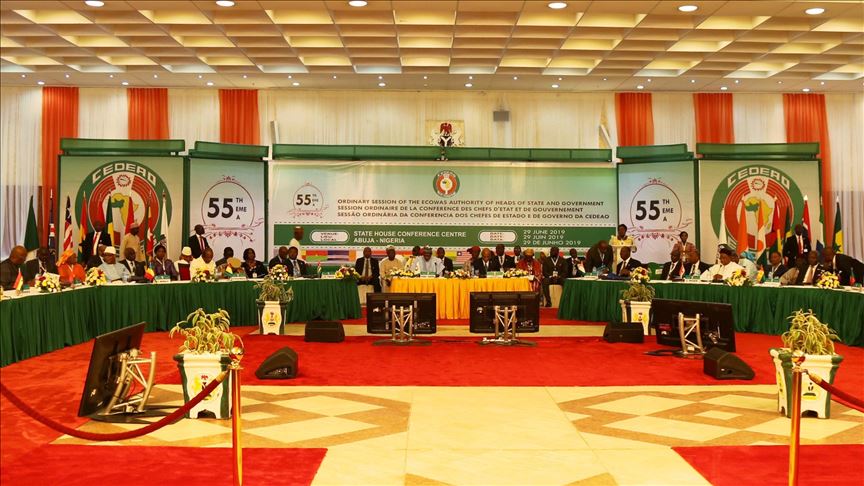
LAGOS, Nigeria
West African political leaders have taken the boldest step towards regional integration after approving a single currency for the 15-member bloc formed in 1975, analysts said.
"The single currency would fast track integration and greatly boost trades and easy movement of goods and people within the bloc," Bashiru Animashaun, an expert on the Economic Community of West African States (ECOWAS), told Anadolu Agency.
“Beyond this, common currency would strengthen the region in global trade because the region will now operate more as a unit. That helps in trade negotiation. Besides, it takes away the stress of exchange rate within the region,” Animashaun said.
Earlier this month, the leaders of the region adopted a proposal to introduce single currency -- named ECO -- for the entire region by 2020.
The introduction of the ECO was initially planned for 2003 but it was repeatedly delayed until 2005, 2010, and 2014 as member countries had failed to agree.
The single currency is a critical phase of the region's integration moves since its founding in 1975. Along with single passport, it is considered an important part of the bloc's Trade Liberalization Scheme which seeks to fuse the area into one economic entity.
The free trade scheme seeks to establish common market, free movement of people, goods and services. Common currency was meant to be the height of the gradualist approach which is modeled after the European Union.
Despite the hitches here and there, analysts said the bloc has achieved most of the integration policies except the common currency recently adopted.
“It is just to actualize the dream of the founding fathers of ECOWAS. The idea of a common currency would definitely unite the region and empower it against external exploitation,” Animashaun said.
Patrick Agbambu, another ECOWAS expert, welcomed the step.
“That was a good one. What we have seen was a good step in the right direction. It will strengthen internal trade and help our people to transact business easily without having to bother about means of economic exchange,” he told Anadolu Agency.
Agbambu said the adoption of the ECO came at a critical moment when political will is required to move the region forward.
- Challenges
However, Agbambu said the success or failure of the policy would be determined by how much of political will is brought to bear, how quickly countries meet entry criteria, and how internal peculiarities of individual member states align with the policy.
“While this policy is good, it remains to be seen how workable it is in the face of conflicting internal dynamics of member states. Certain criteria ought to be met before you can have effective monetary union. The current absence of these criteria might spell doom for the effort,” he said.
The criteria member states ought to meet are primarily four: budget deficit of not more than 3%; average annual inflation rate of less than 10%; central bank financing of budget deficits not exceeding 10% of the previous year's tax revenue; and availability of gross external reserves worth at least three months of imports.
Analysts say there is hardly any ECOWAS member country with such credentials.
“That questions the workability of the 2020 deadline,” Agbambu said, adding that proceeding with a common currency without putting the critical infrastructure in place may not take the region far.
Animashaun agreed about the need for member states to meet the criteria but he disagreed that the current absence of them should stall the process.
“Let us start something first. We will adjust as we go along. Let the few member states who meet some of the criteria join the union. Others can join later,” he said.
“Once there is political will, we will pull through and the region will be better for it.”
However, Animashaun voiced his own concerns.
“The success of the monetary union will depend on the dispositions of member states especially the Francophone countries who still rely on France for a lot of things,” he told Anadolu Agency.
That aligns with the fear that the eight Francophone nations remain tied to their French colonial masters, as evident in their continuous use of the CFA franc which is backed by Paris and is pegged to the euro.
“If they place the interest of the region above any other considerations, then the ECO will be a success,” Animashaun said.
Hassan Dino, an economist, said introducing monetary union when member states still struggle with free movement of people, goods and services may prove ineffective.
“Apart from that, the region needs to put in the necessary infrastructure. However, since they have decided to proceed with it, it is hoped they would critically look at the challenges of infrastructure,” Dino said.
“Equally important is the need to diversify the economy of the region. This will boost internal trade,” he added.
Anadolu Agency website contains only a portion of the news stories offered to subscribers in the AA News Broadcasting System (HAS), and in summarized form. Please contact us for subscription options.



